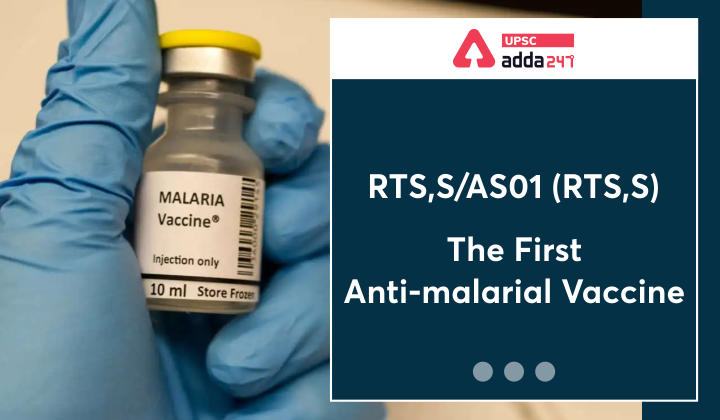Table of Contents
World’s First Malaria Vaccine- Relevance for UPSC Vaccine
- GS Paper 1: Science and Technology-
- Developments and their applications and effects in everyday life;
- Achievements of Indians in science & technology; indigenization of technology and developing new technology.
World’s First Malaria Vaccine- Context
- Recently, the World Health Organization (WHO) made a historic announcement, endorsing the first-ever malaria vaccine, RTS,S, among children in sub-Saharan Africa, and in other regions with moderate-to-high Plasmodium falciparum malaria transmission.
- WHO made its recommendations based on the results from a pilot program administering the vaccine to children in Ghana, Kenya and Malawi.
World’s First Malaria Vaccine- Key Points about Malaria
- About Malaria: Malaria is a life-threatening disease caused by micro-organisms that belong to the genus Plasmodium, and is transmitted by infected female Anopheles mosquitoes.
- Impact on Human Health:
- In 2019, according to the WHO, there were an estimated 229 million cases of malaria, and the estimated deaths were 4,09,000.
- About 67% of the deaths were among children aged under five, the group most vulnerable to malaria.
- About 94% of the cases and deaths due to malaria occurred in the WHO African region, a disproportionately high share of the burden.
- WHO says its regions of Southeast Asia, eastern Mediterranean, western Pacific, and the Americas are also at risk.
- Preventive and treatment interventions against malaria: like bed nets and indoor residual insecticide spraying have continued for years for treating malaria patients.
- Vaccination for malaria: Research for malaria vaccines has been elusive till recently. Recently, WHO endorsed the first-ever malaria vaccine, RTS,S, among children.
National Centre for Disease Control (NCDC)
World’s First Malaria Vaccine- RTS,S or Mosquirix
- About RTS,S or Mosquirix Vaccine: It is a recombinant protein-based vaccine that acts against P. falciparum, believed to be the deadliest malaria parasite globally and the most prevalent in Africa.
- RTS,S or Mosquirix Vaccine reportedly offers no protection against P.vivax malaria, found in many countries outside Africa.
- Development of RTS,S or Mosquirix Vaccine: The development of RTS,S or Mosquirix Vaccine was led by pharma major GSK over 30 years ago.
- In 2001, GSK began collaborating with PATH’s Malaria Vaccine Initiative (MVI).
- In July 2015, the European Medicines Agency authorized the use of the vaccine, concluding that the benefits of the vaccine outweighed the risks.
- Possible side-effects RTS,S or Mosquirix Vaccine: Side-effects include pain and swelling at the injection site and fever, similar to the other children’s vaccines.
- It is associated with an increased risk of febrile seizures within seven days of administration.
- However, no long-lasting consequences were seen.
- Approval by WHO: WHO’s Strategic Advisory Group of Experts on Immunisation and the Malaria Policy Advisory Committee gave the go-ahead for the first-ever anti-malarial vaccine.




 TSPSC Group 1 Question Paper 2024, Downl...
TSPSC Group 1 Question Paper 2024, Downl...
 TSPSC Group 1 Answer key 2024 Out, Downl...
TSPSC Group 1 Answer key 2024 Out, Downl...
 UPSC Prelims 2024 Question Paper, Downlo...
UPSC Prelims 2024 Question Paper, Downlo...




